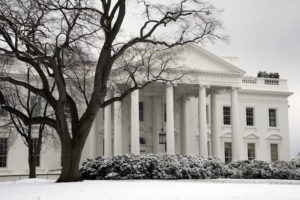
Kavanaugh testifies that Roe is settled as a precedent, Facebook and Twitter executives testify before the Senate Intelligence Committee, and more…
IN THE NEWS
- Supreme Court nominee Judge Brett Kavanaugh testified that Roe v. Wade is “settled as a precedent of the Supreme Court” before the U.S. Senate Committee on the Judiciary. Senate Minority Leader Chuck Schumer (D-N.Y.) reportedly deemed Kavanaugh’s answer a “judicial dodge,” noting that the judge fell short of saying Roe was “correctly decided.” In 2003, then-White House lawyer Kavanaugh reportedly wrote that he was “not sure that all legal scholars refer to Roe as the settled law of the land” because the “Court can always overrule its precedent.”
- Facebook COO Sheryl Sandberg and Twitter CEO Jack Dorsey testified to issues of fake news, “bot” social media accounts that purport to be real people, and violent non-state actors’ use of social media before the U.S. Senate Select Committee on Intelligence. Dorsey relayed that Twitter is “interested” in labeling bot accounts and is “going to do something along those lines.” Earlier this year, Dorsey defended Twitter, saying that platforms like it should not be “arbiters of truth.”
- The U.S. Department of Homeland Security and U.S. Department of Health and Human Services will propose a rule lifting the Flores settlement’s restrictions on how the government may detain immigrant children. Specifically, the proposed rule would shift the determination of detention facilities’ compliance with Flores from state to federal agencies, allowing “families to remain together during their immigration proceedings.” House Minority Leader Nancy Pelosi (D-Cal.) criticized the proposal, noting that it would allow the government to “endlessly” detain families and calling it “another inhumane assault on families and children.”
- The U.S. Department of Agriculture announced its plan to update regulations for four rural development loan programs in an effort to accelerate the lending process and increase capital available to rural communities. Listening sessions will be held throughout September to solicit public comments on the program changes.
- The U.S. Food and Drug Administration (FDA) issued new draft guidance clarifying its methods of evaluating uncertainty when approving new medical devices. The guidance explained that when approving new devices that treat rare conditions or conditions with few alternative treatments, FDA would accept more uncertainty in its risk-benefit analysis so long as the device’s post-market results can be closely tracked.
- The National Institute of Standards and Technology (NIST) announced that it will create a privacy framework to help organizations manage privacy risk. The proposed framework would “bridge the gaps between privacy professionals and senior executives so that organizations can respond effectively to these challenges without stifling innovation,” according to NIST Senior Privacy Policy Advisor Naomi Lefkovitz.
- President Donald Trump announced his intention to nominate Raymond David Vela as director of the National Park Service (NPS). Vela, current superintendent of the Grand Teton National Park and the John D. Rockefeller Memorial Parkway, would be the first Hispanic director of the NPS. Vela noted the “importance of ensuring that we build a next generation workforce that is ready to take on the challenges and opportunities facing our agency.”
- Eight state attorneys general sued the Trump Administration over its policy of not punishing parties responsible for harming birds protected under the Migratory Bird Treaty Act (MBTA). This policy arose from a memo from the U.S. Department of the Interior, which stated that applying the MBTA “to incidental or accidental actions hangs like the sword of Damocles over a host of otherwise lawful and productive actions.” New York Attorney General Barbara Underwood called the policy “reckless and illegal,” noting that migratory birds provide “critical ecological, scientific, and economic value.”
- The Massachusetts Supreme Judicial Court ruled that power plants must comply with the state’s Global Warming Solutions Act (GWSA). The New England Power Generators Association had argued that power plants as part of the “electric sector” were not subject to the GWSA, which set standards for carbon emissions reductions by 2020. But Chief Justice Scott Kafker stated that given the legislature’s clear intention to reduce emissions it would “make little to no sense” to exclude power plants from the regulations.
WHAT WE’RE READING THIS WEEK
- In a recent research paper, Arnold W. Reitze of the University of Utah S.J. Quinney College of Law examined Judge Brett Kavanaugh’s opinions for the U.S. Court of Appeals for the D.C. Circuit concerning the Clean Air Act (CAA). Reitze noted that Judge Kavanaugh’s opinions focus especially on the doctrine of separation of powers and the “literal language of the statute,” and described Judge Kavanaugh’s main “priority” as “protecting the legislative branch from efforts by EPA to expand its authority through its interpretation of the CAA.”
- In a paper published in Law and Digital Economy, Stephan Breu of the Kutafin Moscow State Law University addressed regulatory challenges associated with blockchain technology, including the difficulty of determining the appropriate jurisdiction for legal actions. The decentralized nature of the technology, Breu argued, demands a new approach to the “traditional legislative understanding” of jurisdictional rules.
- An anonymous senior official in the White House wrote that President Trump is “generally anti-trade and anti-democratic” but praised his “effective deregulation” in an op-ed for The New York Times. The senior official, a self-described member of the Trump-appointee “resistance,” called President Trump’s deregulatory successes one of his Administration’s “bright spots.”



